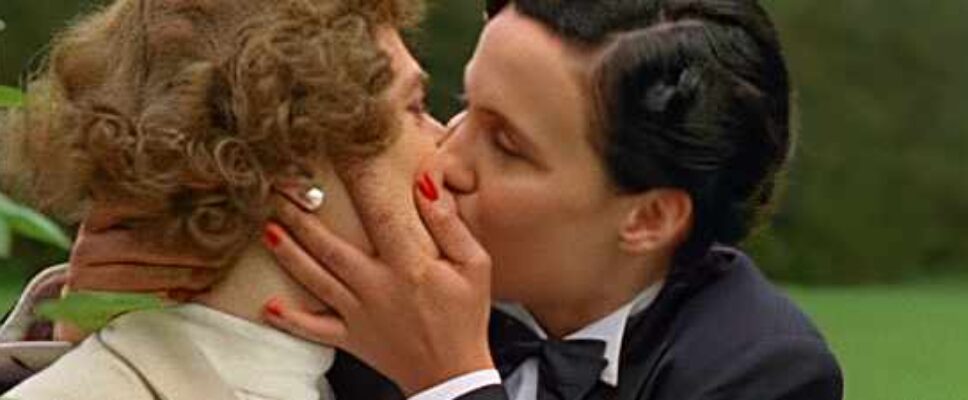Teresa Reviews Je ne suis pas coupable (2009), the French “Sad Cypress”
Teresa reviews Je ne suis pas coupable (2009) where a police inspector impersonates a woman to infiltrate a suffragette meeting.
Translated title: I Am Not Guilty
Watch the episode on Amazon Prime
(c)2023 by Teresa Peschel
Fidelity to text: 2½ pillows
 The plot’s there. So is the complex backstory. Everything else is different.
The plot’s there. So is the complex backstory. Everything else is different.
Quality of film: 3½ pillows
 This swings wildly between comedy and tragedy. Eleanor doesn’t get her happy ending. No one does.
This swings wildly between comedy and tragedy. Eleanor doesn’t get her happy ending. No one does.
Read more of Teresa’s Agatha Christie movie reviews at Peschel Press.
Also, follow Teresa’s discussion of these movie on her podcast.

 Wait. What? Crossdressing? Lampion disguises himself as a woman, like Dustin Hoffman in Tootsie (1982) in order to do his job? Well, yes. He doesn’t want to. He’s no actor, he doesn’t know how to behave or give a fiery suffragette speech and besides, it’s embarrassing and demeaning. But Larosière insists.
Wait. What? Crossdressing? Lampion disguises himself as a woman, like Dustin Hoffman in Tootsie (1982) in order to do his job? Well, yes. He doesn’t want to. He’s no actor, he doesn’t know how to behave or give a fiery suffragette speech and besides, it’s embarrassing and demeaning. But Larosière insists.
The Sûreté of the time in Northern France had no women constables available, or so the episode implies. The show takes place in the mid-1930s, making that hard to believe. The Sûreté must have had women police officers going back to the Great War if only to handle female criminals and prisoners. That’s why women’s prisons got wardresses very early on in the history of policing. They’re less likely to assault and rape the women prisoners than male wardens.
Or, possibly, Larosière was in too much of a hurry to wait for a policewoman to arrive. Or far more likely, the scriptwriter felt that Lampion needed to be the butt of the joke again, emphasizing his ineptness and insecurities like the show did in La Maison du Peril where he was a comically inept handyman as well as unable to handle a pistol. This despite his bravely shooting it out and getting wounded in the line of duty earlier in La Plume Empoisonnee and having to convalesce in a quiet village.

This bizarre subplot felt like a harbinger of season two of Les Petits Meurtres d’Agatha Christie when fidelity to the novel or to real-life behavior was tossed out the window. I know Larosière and Lampion were in a hurry to investigate a possible crime (nothing had been happening for weeks and Larosière was bored) but it felt incongruous and wrong, especially when compared to Eleanor’s tragic situation.
Lampion didn’t just have to impersonate a famous French suffragette, including giving a speech to a group of other suffragettes. The entire plot got a radical makeover. It’s still lurking under the new, extreme wardrobe and exaggerated cosmetics.


Nurse Jessie Hopkins verifies that Laura was a difficult woman. She easily got the job as Laura’s nurse because no one else would put up with her. Despite Laura’s vows of solidarity with her fellow oppressed women, she doesn’t include servants.
This Eleanor is very different. She’s an unpleasant, needy, bad-tempered, jealous woman. She’s angry when her fiancé Roddy speaks to another woman, fantasizing about how Roddy is cheating on her and then proceeding to the glorious daydream of shooting Roddy and the other woman multiple times in front of that woman’s young son. She’s not a murderess but you won’t feel any sympathy for her.


Dr. Peter Lord morphs into Luara’s secretary and personal assistant. He and Eleanor grew up together (Eleanor mentions how he still blushes like he did as a boy) and he’s loved her from afar for years. He pushes Larosière and Lampion to investigate when the poison pen letters show up. He covers up for Lampion and Larosière when they impersonate the suffragette and her husband (Larosière’s role in the deception). He’s the only person who believes Eleanor didn’t suffocate her mother with a pillow or stab Mary with the shears. He pushes harder for them to save her when she’s arrested, tried for murder, condemned, and awaits the guillotine.
Does Dr. Lord get his faithfulness and fidelity rewarded? He does not. He reveals himself to Eleanor and she rejects him. She wants Roddy, despite how he treated her and how her own jealousies and insecurities were tearing them apart. Roddy will never accept her back. He’d be a fool to do so. But Dr. Lord, who’s always loved her, isn’t acceptable.
It’s hard to feel any sympathy for Eleanor despite her cold and emotionally destructive upbringing. She’s not doing one damned thing to develop a better character and it doesn’t seem she learns a thing about real love or loyalty or how to treat people.
Lampion manages to give a fiery, impassioned speech to the suffragettes about human dignity but when he’s revealed as a man in drag, he gets slapped for his heartfelt efforts. The fine, rich, fancy suffragettes don’t notice the maids in the background, setting up the chairs and the food, either. Rights are for the upper classes, don’t you know, because someone has to scrub those floors and it won’t be them.
Poor Eleanor. Poor Dr. Lord. It will be up to the fanfiction writers to give them their happy ending where she comes to her senses and he decides she’s worth taking a chance on, despite what he’s learned about her.
And poor Lampion. He keeps trying but he’s not getting any respect, in a dress or out of one.


